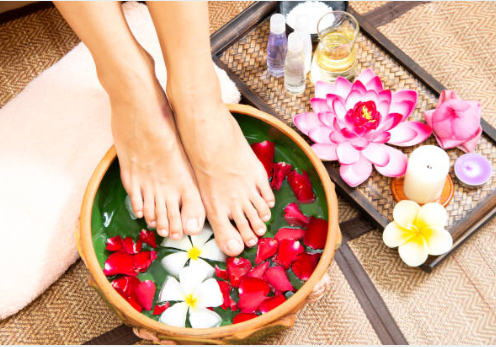Self Care to Help with Anxiety
Practicing self care to help with anxiety can be an effective way to deal with stress. Whether you are dealing with a mental health disorder or a more generalized feeling of anxiety, there are several ways to help relieve stress and tension.

Selfpause Affirmation App
Download the app to get 1,000’s of affirmation meditations and everything you need to write, record and listen to your own.
Engaging your senses

Taking time to engage your senses will improve your health and happiness. Incorporating a few self care activities into your daily routine will help you reduce anxiety symptoms, boost energy levels, and improve cognitive functioning.
An exercise called the 5-4-3-1 exercise is an effective way to incorporate sensory input into your daily routine. The five senses include sight, smell, taste, touch, and sound. You can use this exercise to divert your mind from the negative thoughts that are triggering your anxiety.
You can also use the five senses to help you feel more grounded. Grounding exercises include taking a deep breath, contracting your rib cage, and touching something. You can also ground yourself by noticing the textures of your surroundings. You may also want to try breathing exercises to calm your belly, rib cage, and collar bones.
You can also practice aromatherapy. This can be done with scented hand cream, scented room spray, or your favorite perfume. A pleasant smell can help relax you and boost your mood. It can also improve your sleep and reduce your anxiety.
Another exercise to try is the five senses meditation. This technique will help you to take a break from your busy life and focus on the present moment. You may want to try it when you’re watching TV, playing games, or doing other tasks that can trigger anxiety.
The art of savoring is also a good example of using sensory input to help alleviate anxiety symptoms. Savoring the scent of lavender can help you to relax and sleep better. You can also enjoy the scent of a favorite perfume or dried fruit. It can also bring back pleasant memories of your childhood.
Deep breathing

Practicing deep breathing can help you calm down and relieve anxiety. It can also help you deal with other anxiety-related symptoms. It can also help you avoid panic attacks.
Deep breathing is a very simple exercise that you can do any time. You can learn more about it on websites and apps. However, you do not have to consult a doctor about it. It is a good idea to keep a log of your breathing exercises. You can also use reminders to help you remember.
To begin, sit in a comfortable position. Make sure you close your eyes. Then, place one hand on your chest. With the other hand, place it on your belly. Count to three as you inhale. Then, exhale as long as you can.
Try deep breathing exercises in addition to your regular exercise routine. Try the exercises at least twice a day. They can be effective in the moment, but do not overdo them. If you start to experience symptoms, stop exercising. You should also track your symptoms and see if they improve.
Shallow breathing causes your body to respond by tightening up your chest. It can make you feel short of breath. It also can reduce the range of motion in your diaphragm. Taking rapid shallow breaths from your chest can disrupt your carbon dioxide levels, increase your heart rate, and cause dizziness.
When you begin to feel anxious, you may notice that you take shallow breaths from your chest. These can make you feel tense and short of breath. Your body may even begin to hyperventilate. This can cause dizziness and muscle tension.
The more you practice deep breathing, the better you’ll get at it. It’s a good idea to start slowly, gradually increasing the time you spend.
Engaging your mind

Using your brain is a great way to reduce your anxiety symptoms. The brain has the ability to strengthen and grow with experience. This means that you will have to be patient to see any improvement.
A good start is to get more sleep. You should aim for at least 6 to 8 hours a night. You should also try to develop a sleep routine. You should also change into pajamas before you fall asleep.
In addition to sleep, you should also try to reduce your stress. This can be achieved through a variety of strategies. For example, you could meditate and practice breathing exercises. You should also consider a healthier diet. Including fruits, vegetables, and lean meats in your diet can go a long way towards improving your overall health and well-being.
You can also use the mind-body connection to positively influence your physical response to stress. Taking a few moments to reflect on your thoughts can help you get a better handle on your feelings.
For example, you may notice that your heart is pounding out of your chest faster than usual. You may also notice that your hands are cold. This is the brain’s way of telling you that you are stressed out.
The best way to reduce your anxiety is to stay in the present. If you notice your mind is wandering off into the past or future, you should make a conscious effort to focus on the present. You should also try to use your five senses to help you. You could try to look for details in an object you see, such as a picture of your pet. You can also try to relax your body by holding an item for a few seconds.
Cultivating gratitude

Gratitude for self care can be a great tool to reduce anxiety symptoms. Cultivating a sense of gratitude for yourself and others can have a significant positive impact on your overall mental health. It may seem like an unlikely combination, but scientific research is showing that gratitude can help relieve anxiety symptoms and improve overall well-being.
Cultivating gratitude for self care can take time. But once you start practicing gratitude, it will become a habit. Your brain will be trained to focus on the positive and your life will become less stressful.
You can start by taking stock of all the things you’re grateful for. Writing about them can be a great way to appreciate them more fully. Writing about positive events can also help you to feel more optimistic about your life.
Studies have shown that cultivating gratitude can help people to be more emotionally available, to reduce depression, and to improve sleep. Studies have also shown that gratitude can increase positive feelings, increase optimism, and improve relationships.
A study compared people who counted blessings to people who identified challenges. They found that the group who counted their blessings reported more positive feelings and had greater wellbeing than the control group.
Researchers have also found that cultivating gratitude has benefits for depression and anxiety. Practicing gratitude can be like a workout for your mind. It will reduce stress and anxiety, increase emotional well-being, and increase feelings of connection to the world.
Writing down three or five things you are grateful for can be a great way to realize your gratitude. You can also write an appreciation note or letter to someone. You can also write about the things you are grateful for each day.
Keeping a journal

Keeping a journal to help with anxiety can be a great way to manage your emotions and stress. You can use it to track your symptoms, identify stress triggers, and find solutions. You can also incorporate it into therapy or self-help techniques.
Keeping a journal to help with anxiety can be an enjoyable hobby. There are many different methods and styles of journaling. You can write by hand, on a computer, or use stickers and images. You can even create a bullet journal.
The benefits of journaling for anxiety can be a boost to your mental and physical health. Studies have shown that writing about traumatic experiences can decrease depressive symptoms and overall mental distress. In addition, writing about positive feelings increases well-being and reduces symptoms of anxiety.
Keeping a journal to help with anxiety can also help you get to the root of your fears. Often, anxiety is caused by the body’s natural reaction to stress. Writing about traumatic experiences can help you process your feelings and understand them better. You can also write about angry thoughts and feelings.
If you are not sure how to start, you can use a journal prompt. The prompts can be used multiple times, and they can give you a solid starting point. The journaling process will also reveal new insights over time.
You can start with 5 to 15 minutes a day. As you become more comfortable with the process, you can increase the time. If you are working with a therapist, you may want to review your journal entries periodically.
Keeping a journal to help you with anxiety can be a great way to kickstart your journey toward building resilience. It can also be a source of inspiration when you need it.
Our Top FAQ's
Some self-care activities that can help reduce anxiety include:
- Exercise or physical activity, which can help to reduce stress and improve mood
- Deep breathing exercises or other relaxation techniques, such as progressive muscle relaxation or mindfulness meditation
- Getting enough sleep and practicing good sleep hygiene
- Eating a healthy diet and staying hydrated
- Engaging in activities that you enjoy, such as hobbies or spending time with loved ones
- Taking breaks and setting aside time for relaxation and rest
- Seeking professional help, such as therapy or medication, if needed
To incorporate self-care into your daily routine, try setting aside specific times each day to engage in self-care activities. You might also consider setting small, achievable goals for yourself and rewarding yourself when you reach them. It can also be helpful to create a list of self-care activities that you enjoy and refer to it when you’re feeling overwhelmed or anxious.
To identify the specific triggers for your anxiety, it can be helpful to keep a journal or record of your anxiety symptoms and the events or circumstances that precede them. This can help you to identify patterns and potential triggers for your anxiety. Once you have identified your triggers, you can work with a therapist or other mental health professional to develop strategies to manage them.
To better manage your thoughts and emotions, you can try practicing mindfulness techniques, such as focusing on your breath or paying attention to your surroundings in the present moment. You can also try cognitive-behavioral techniques, such as questioning negative thoughts and replacing them with more positive or realistic ones.
There are many resources available to help you take care of yourself and manage your anxiety. These can include therapy or counseling, support groups, self-help books or online resources, and medication if needed. It can also be helpful to reach out to loved ones or trusted friends for support and encouragement. Don’t be afraid to ask for help if you need it.
